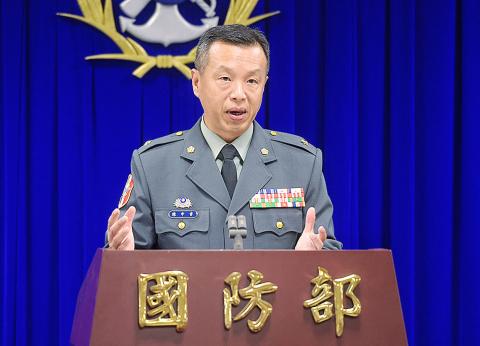The Ministry of National Defense is to obtain three asymmetric warfare weapons for the army and air force, in addition to the navy’s ongoing program to develop small fast-attack missile boats, an anonymous senior defense official said.
The army is to be given medium-range anti-tank missiles and a ground mobile minelayer system, and the air force is to be given a new gun-based close-in weapons system, the official said.
The ministry favors buying the equipment from domestic sources whenever possible and would consider buying from foreign suppliers only if local firms are unable to produce the weapons, the official said.

Photo: Chang Chia-ming, Taipei Times
The consultation period with domestic industries began earlier this month and the Ministry of Economic Affairs has begun a feasibility study of the nation’s capability to manufacture the weapons, they said.
The ministry is pressing forward with the fast-attack missile boat program, despite misgivings among members of the military and the shipbuilding sector, the official said.
The army needs anti-tank missiles and the minelayer system to combat enemy armor in anti-amphibious operations, the official said.
The air force’s request for a close-in weapons system was prompted by the rising threat of Chinese air and naval forces, which have been conducting exercises at the edges of Taiwan’s airspace, they said.
The close-in weapons system would protect installations on Taiwan’s east coast, particularly the Chiashan Base’s (佳山) underground complex in Hualien County, the official said.
A mission requirement for the minelayers, that they be capable of laying mines on Taiwan proper as well as Kinmen and Matsu, has sparked concerns from some ministry officials, sources said.
The officials have said that as the military has just completed clearing Kinmen and Matsu of landmines, procuring another minelaying system with such a mission requirement could alarm the public, the sources said.
Military procurements are determined by operational needs, ministry spokesman Major General Chen Chung-chi (陳中吉) said.
The minelayers would lay anti-tank mines, which comply with international conventions, not anti-personnel mines, Chen said.
Their operational role would involve laying mines on the likely approach routes of enemy armor units as battles develop, not emplacing semi-permanent minefields, he said.
In related news, the Taiwan Shipbuilding Industry Association yesterday began hosting a two-day media tour for major shipbuilders and defense industry firms involved in the manufacture of machinery, bullet-proof materials, and assault boats and helicopter maintenance.
Ko Lead Aerospace Co (科力航太), Jong Shyn Shipbuilding Co (中信造船), Chungshan Institute of Science and Technology, HCG Corp (和成集團) and Champion Auto Co (金賓汽車) are among the industries participating in the event.

The US government has signed defense cooperation agreements with Japan and the Philippines to boost the deterrence capabilities of countries in the first island chain, a report by the National Security Bureau (NSB) showed. The main countries on the first island chain include the two nations and Taiwan. The bureau is to present the report at a meeting of the legislature’s Foreign Affairs and National Defense Committee tomorrow. The US military has deployed Typhon missile systems to Japan’s Yamaguchi Prefecture and Zambales province in the Philippines during their joint military exercises. It has also installed NMESIS anti-ship systems in Japan’s Okinawa

‘WIN-WIN’: The Philippines, and central and eastern European countries are important potential drone cooperation partners, Minister of Foreign Affairs Lin Chia-lung said Minister of Foreign Affairs Lin Chia-lung (林佳龍) in an interview published yesterday confirmed that there are joint ventures between Taiwan and Poland in the drone industry. Lin made the remark in an exclusive interview with the Chinese-language Liberty Times (the Taipei Times’ sister paper). The government-backed Taiwan Excellence Drone International Business Opportunities Alliance and the Polish Chamber of Unmanned Systems on Wednesday last week signed a memorandum of understanding in Poland to develop a “non-China” supply chain for drones and work together on key technologies. Asked if Taiwan prioritized Poland among central and eastern European countries in drone collaboration, Lin

Renewed border fighting between Thailand and Cambodia showed no signs of abating yesterday, leaving hundreds of thousands of displaced people in both countries living in strained conditions as more flooded into temporary shelters. Reporters on the Thai side of the border heard sounds of outgoing, indirect fire yesterday. About 400,000 people have been evacuated from affected areas in Thailand and about 700 schools closed while fighting was ongoing in four border provinces, said Thai Rear Admiral Surasant Kongsiri, a spokesman for the military. Cambodia evacuated more than 127,000 villagers and closed hundreds of schools, the Thai Ministry of Defense said. Thailand’s military announced that

CABINET APPROVAL: People seeking assisted reproduction must be assessed to determine whether they would be adequate parents, the planned changes say Proposed amendments to the Assisted Reproduction Act (人工生殖法) advanced yesterday by the Executive Yuan would grant married lesbian couples and single women access to legal assisted reproductive services. The proposed revisions are “based on the fundamental principle of respecting women’s reproductive autonomy,” Cabinet spokesperson Michelle Lee (李慧芝) quoted Vice Premier Cheng Li-chiun (鄭麗君), who presided over a Cabinet meeting earlier yesterday, as saying at the briefing. The draft amendment would be submitted to the legislature for review. The Ministry of Health and Welfare, which proposed the amendments, said that experts on children’s rights, gender equality, law and medicine attended cross-disciplinary meetings, adding that